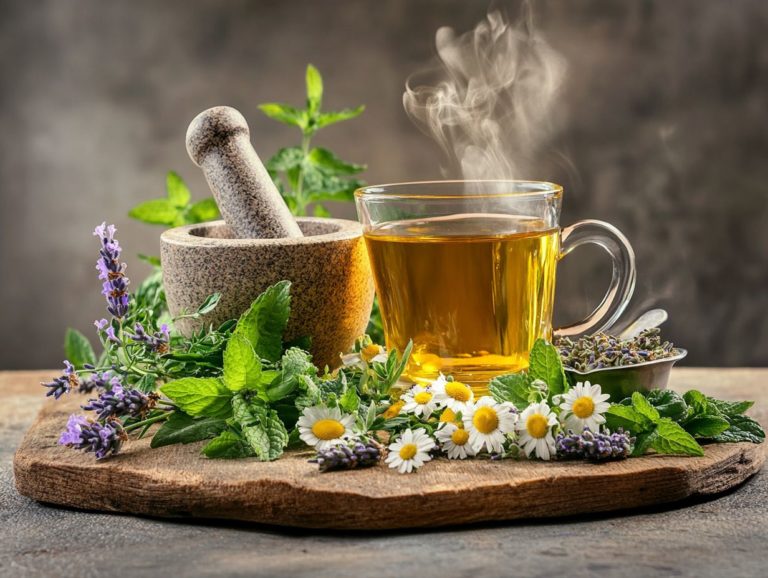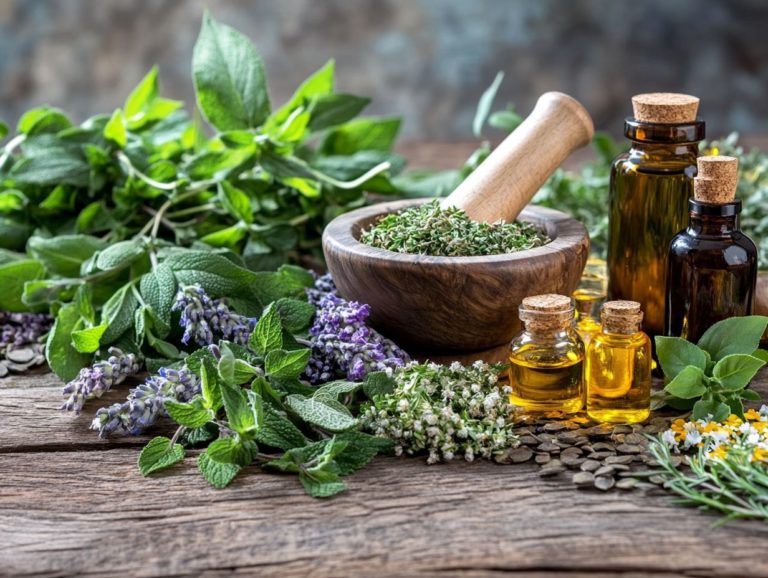How to Read Herbal Medicine Research?
Herbal medicine has recently captured significant attention, leading to an impressive rise in research that explores its myriad benefits and applications. This includes plant-derived products and complementary and alternative medicine.
To truly grasp this field, you need more than just curiosity; it demands a critical eye and strong analytical skills, particularly in data analysis. This article explores the essentials of herbal medicine research, highlighting its importance, key elements, and the best practices for interpreting and evaluating findings with confidence while focusing on risk awareness in health-related issues.
Whether you re a practitioner, a student, or simply fascinated by the world of natural remedies, this guide will provide you with essential tools to navigate the realm of herbal research with assurance. You will gain insights into treatment aims and user motivations.
Contents
- Key Takeaways:
- Understanding Herbal Medicine Research
- The Importance of Reading Herbal Medicine Research
- Key Elements of Herbal Medicine Research
- Interpreting Herbal Medicine Research
- Evaluating the Quality of Herbal Medicine Research
- Tips for Reading Herbal Medicine Research
- Frequently Asked Questions
- What is herbal medicine research?
- Why is it important to know how to read herbal medicine research?
- What are some key elements to look for when reading herbal medicine research?
- How can I determine the credibility of herbal medicine research?
- What are some common pitfalls to avoid when reading herbal medicine research?
- How can I apply the findings of herbal medicine research to my own health?
Key Takeaways:

- Herbal medicine research studies the effectiveness and safety of natural remedies derived from plants, including popular herbal supplements like St. John’s wort and Echinacea.
- Reading herbal medicine research helps you make informed decisions about using herbal remedies and understanding their potential benefits and limitations, especially regarding self-medication and preventive care.
- Understanding key elements and evaluating research quality is crucial for properly interpreting and applying herbal medicine findings, including recognizing the importance of FDA regulations.
Understanding Herbal Medicine Research
Understanding herbal medicine research is crucial for your journey into herbal medicine, whether you’re a practitioner or a user. This field intricately weaves together traditional wisdom, including family traditions, and modern scientific exploration.
Often, this research uses a method that focuses on understanding experiences, employing focus group studies and focus group discussions. Its goal is to evaluate the effectiveness of various herbal remedies in treating everything from mild ailments and acute illnesses to chronic and even severe conditions. This effectively bridges the divide between conventional medicine and alternative therapies.
By closely examining treatment objectives and participant recruitment strategies, including age-specific focus groups, researchers can tackle health-related challenges more effectively and enhance the delivery of holistic healthcare services.
The Importance of Reading Herbal Medicine Research
Engaging with herbal medicine research is crucial for grasping the applications and benefits of medicinal uses derived from plant sources, especially within the context of complementary and alternative medicine and botanical medicine.
This knowledge empowers you to appreciate the full potential of these natural remedies in promoting health and well-being, particularly for chronic conditions and health promotion.
Benefits and Applications
Herbal remedies present a wealth of benefits and applications for an array of health conditions, ranging from mild ailments to chronic illnesses. They position themselves as essential players in health promotion strategies.
For example, turmeric, celebrated for its anti-inflammatory properties, can be especially beneficial for those grappling with arthritis and other conditions like cardiovascular issues. Meanwhile, peppermint might provide the digestive relief that younger individuals are seeking as they gravitate toward natural remedies, including herbal supplements known for their digestive benefits.
Older adults often turn to ginseng, appreciating its energy-boosting attributes, as part of their family traditions in seeking alternative therapies. It’s important to understand that user characteristics such as age, lifestyle, and existing health conditions as well as user demographics, can greatly impact how well these herbal treatments work.
Conventional medicine often views these remedies with skepticism, underscoring the necessity for clinical trials, which are studies that test the safety and effectiveness of treatments, to authenticate their effectiveness. However, there is a growing acknowledgment of the potential advantages of blending herbal solutions with traditional therapies. This integrated approach is particularly valuable in patient-centered care, where the focus is on the individual s unique needs and preferences, emphasizing the importance of positive experiences in treatment successes.
Key Elements of Herbal Medicine Research

Key elements of herbal medicine research frequently encompass qualitative data collection methods, such as focus group studies and qualitative content analysis. These approaches facilitate in-depth discussions, providing you with valuable insights into user experiences and health-related concerns, including dissatisfaction with treatment options.
Methods and Findings
In your exploration of herbal medicine research, you’ll find a range of methods at your disposal, including qualitative approaches and qualitative content analysis. These methods are designed to extract meaningful insights from participant recruitment processes and age-specific focus groups.
Engaging in in-depth interviews and focus group discussions allows you to delve into user experiences and opinions within a structured yet adaptable framework, particularly focusing on health care provider interactions. For example, studies examining patients’ satisfaction levels with herbal treatments for issues like anxiety, chronic pain, and digestive disorders often reveal that users are driven by both effectiveness, positive experiences, and the holistic appeal of these remedies.
Participants frequently express a distinct preference for natural alternatives, highlighting benefits such as fewer side effects and a sense of empowerment in managing their health, particularly through self-medication. This underscores the critical importance of grasping user perspectives, including motivations for seeking herbal remedies, as the landscape of herbal treatments continues to evolve.
Interpreting Herbal Medicine Research
Interpreting herbal medicine research requires you to engage in a meticulous analysis of health-related data alongside user experiences, especially focusing on treatment methods and participant demographics. This thoughtful approach allows you to draw meaningful conclusions regarding the effectiveness of various treatment methods, including plant medicines, ensuring that your insights are both informed and impactful.
Evaluating the Quality of Herbal Medicine Research
Evaluating the quality of herbal medicine research requires a discerning look at study design and credibility, especially when considering FDA regulations that govern herbal supplements and their implications for chronic conditions. It s essential to assess these factors meticulously to form a well-rounded understanding of the efficacy and safety of such products.
Assessing Study Design and Credibility

Assessing study design and credibility in herbal medicine research requires you to delve into methods that focus on people’s experiences and opinions, including qualitative data, and understand the user demographics.
Consider the various study designs, from randomized controlled trials where participants are randomly assigned to different groups to test the effectiveness of treatments to observational studies. Each design plays a crucial role in evaluating herbal remedies for medicinal purposes and health care services. When conducting research, it’s also important to know what to include in herbal remedy research.
Randomized designs offer rigorous control, minimizing bias. Observational studies provide real-world applicability by capturing a diverse range of user experiences, highlighting treatment successes and challenges.
However, these strengths can be compromised by weaknesses such as limited sample sizes or ethical concerns, particularly in studies addressing severe illnesses.
User demographics, such as age, gender, and cultural background, significantly influence how findings are perceived. This, in turn, impacts the reliability and acceptance of herbal remedies across different populations. Recognizing these factors empowers you to evaluate the acceptance and effectiveness of herbal medicine across various groups. To enhance your understanding, learning how to find reliable sources for herbal information is essential, especially in the context of alternative medicine strategies.
Tips for Reading Herbal Medicine Research
To truly grasp and appreciate herbal medicine research, embrace strategic approaches that elevate your comprehension and retention of essential information tied to health education. Familiarizing yourself with botanical medicine practices provides you the power to navigate the nuances of the subject with confidence and clarity.
Strategies for Understanding and Retaining Information
Implementing strategies to understand and retain information about herbal remedies gives you the power to make informed decisions about your health care and alternative medicine options, including considering medicinal purposes and preventive care.
To successfully navigate the vast array of herbal treatments available, adopt effective methods like summarizing key points from reliable sources, such as BMC Complementary and Alternative Medicine.
Engaging with supplementary resources such as scientific articles and reputable online platforms, including research by Eisenberg enables you to deepen your knowledge and distinguish facts from myths.
Participating in discussions within focus groups or age-specific groups can offer valuable insights and shared experiences that enhance your understanding. Your experiences play a crucial role in shaping perceptions and attitudes toward these alternative therapies, fostering a community where informed choices flourish and personal testimonies enrich the collective wisdom regarding self-medication and user motivations.
Frequently Asked Questions
What is herbal medicine research?

Herbal medicine research is the study and analysis of the effectiveness, safety, and potential uses of herbs and natural products for medicinal purposes. This includes the role of plant medicines in treating various medical conditions.
Why is it important to know how to read herbal medicine research?
Knowing how to read herbal medicine research allows you to make informed decisions about your health and the use of herbal remedies, particularly in conventional medicine. It helps you spot reliable information versus myths, especially when navigating herbal supplements and alternative therapies.
What are some key elements to look for when reading herbal medicine research?
Key elements to look for include the source of the research, study design, sample size, methods used, and the results and conclusions drawn, including risk awareness regarding health conditions.
How can I determine the credibility of herbal medicine research?
To determine the credibility of herbal medicine research, consider the source, the qualifications and reputation of the researchers, and whether the study has been published in a reputable scientific journal, such as studies on Ginkgo or neurodermatitis.
What are some common pitfalls to avoid when reading herbal medicine research?
Some common pitfalls to avoid when reading herbal medicine research include relying on information from unreliable sources and misinterpreting study results.
It’s also a mistake to assume causation from correlation. Understanding the context of complementary and alternative medicine is crucial.
How can I apply the findings of herbal medicine research to my own health?
Don’t overlook the importance of consulting a healthcare provider before adding herbal remedies to your routine! They can guide you on the safety and effectiveness of herbs tailored to your health needs.
Discuss plant-derived products like St. John’s wort and Echinacea for mild illnesses or chronic conditions with them to ensure you’re making informed choices.






